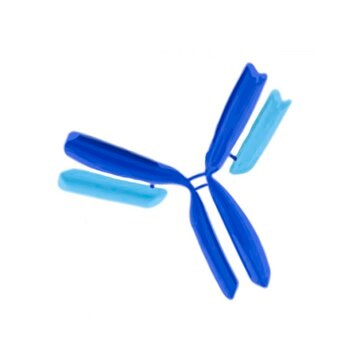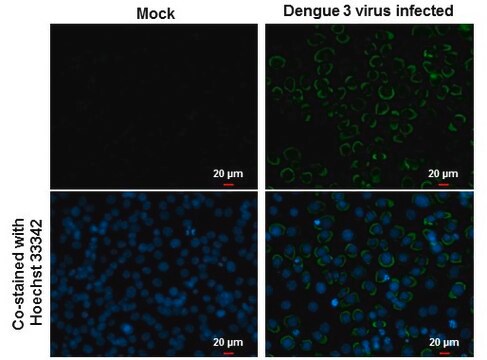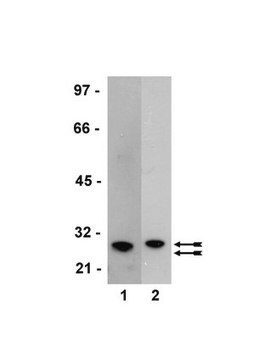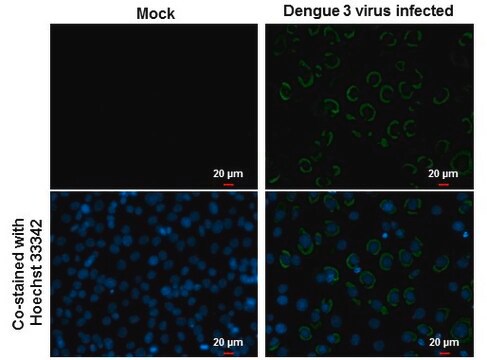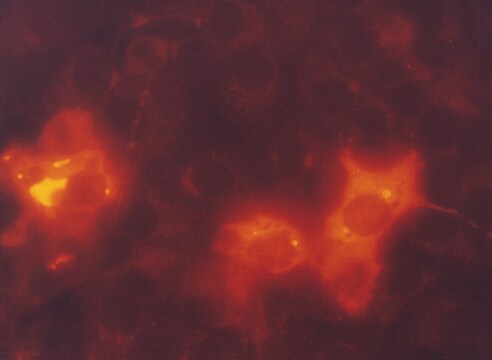MAB8703
Anti-Dengue Virus Type III Antibody, clone 5D4-11
clone 5D4-11, Chemicon®, from mouse
Faça loginpara ver os preços organizacionais e de contrato
About This Item
Código UNSPSC:
12352203
eCl@ss:
32160702
NACRES:
NA.41
Produtos recomendados
fonte biológica
mouse
Nível de qualidade
forma do anticorpo
purified antibody
clone
5D4-11, monoclonal
reatividade de espécies
human
fabricante/nome comercial
Chemicon®
técnica(s)
immunofluorescence: suitable
Isotipo
IgG1
Condições de expedição
wet ice
Descrição geral
Dengue fever is an acute, mosquito-transmitted viral disease characterized by fever, headache, arthralgia (severe retro-orbital pain), myalgia, rash, nausea, and vomiting. Infections are caused by any of the four closely related, but antigenically distinct virus serotypes (DEN-1, DEN-2, DEN-3, and DEN-4). Infection with one of these serotypes does not provide cross-protective immunity, so persons living in a dengue-endemic area can have four dengue infections during their lifetimes. Dengue is primarily an urban disease of the tropics, and the viruses that cause it are maintained in a cycle that involves humans and Aedes aegypti, a domestic, day-biting mosquito that prefers to feed on humans. Although most dengue infections result in relatively mild illness, some can produce Dengue Hemorrhagic Fever (DHF) or dengue shock syndrome, with children being particularly at risk. Although epidemic outbreaks have been reported since 1779, the incidence has been increasing, with global, multiple serotype pandemics intensifying within the last 15 years. There is no specific antiviral therapy for dengue, but for both classical dengue and dengue hemorrhagic fever, symptomatic and supportive measures are effective. Important risk factors for DHF include the strain and serotype of the virus involved, as well as the age, immune status, and genetic predisposition of the patient.
Especificidade
Reacts with the Dengue type 3 virus.
Imunogênio
Dengue virus antigens (H87).
Aplicação
Anti-Dengue Virus Type III Antibody, clone 5D4-11 is an antibody against Dengue Virus Type III for use in IF.
Immunofluorescent assay.
Final working dilutions must be determined by end user.
Final working dilutions must be determined by end user.
Research Category
Infectious Diseases
Infectious Diseases
Research Sub Category
Infectious Diseases - Viral
Infectious Diseases - Viral
forma física
Format: Purified
Purified. 0.02M Phosphate Buffer, pH 7.6, 0.25M NaCl and 0.1% sodium azide.
Armazenamento e estabilidade
Maintain at 2-8°C in undiluted aliquots for up to 12 months. Avoid repeated freeze/thaw cycles.
Outras notas
Concentration: Please refer to the Certificate of Analysis for the lot-specific concentration.
Informações legais
CHEMICON is a registered trademark of Merck KGaA, Darmstadt, Germany
Exoneração de responsabilidade
Unless otherwise stated in our catalog or other company documentation accompanying the product(s), our products are intended for research use only and are not to be used for any other purpose, which includes but is not limited to, unauthorized commercial uses, in vitro diagnostic uses, ex vivo or in vivo therapeutic uses or any type of consumption or application to humans or animals.
Código de classe de armazenamento
10 - Combustible liquids
Classe de risco de água (WGK)
WGK 2
Ponto de fulgor (°F)
Not applicable
Ponto de fulgor (°C)
Not applicable
Certificados de análise (COA)
Busque Certificados de análise (COA) digitando o Número do Lote do produto. Os números de lote e remessa podem ser encontrados no rótulo de um produto após a palavra “Lot” ou “Batch”.
Já possui este produto?
Encontre a documentação dos produtos que você adquiriu recentemente na biblioteca de documentos.
Evaluation by flow cytometry of antibody-dependent enhancement (ADE) of dengue infection by sera from Thai children immunized with a live-attenuated tetravalent dengue vaccine.
Bruno Guy, Pornthep Chanthavanich, Sophie Gimenez, Chukiat Sirivichayakul et al.
Vaccine null
Identification of distinct antigenic determinants on dengue-2 virus using monoclonal antibodies.
Gentry, M K, et al.
The American Journal of Tropical Medicine and Hygiene, 31, 548-555 (1982)
Dengue virus-specific and flavivirus group determinants identified with monoclonal antibodies by indirect immunofluorescence
Henchal, E A, et al
The American Journal of Tropical Medicine and Hygiene, 31, 830-836 (1982)
Nossa equipe de cientistas tem experiência em todas as áreas de pesquisa, incluindo Life Sciences, ciência de materiais, síntese química, cromatografia, química analítica e muitas outras.
Entre em contato com a assistência técnica